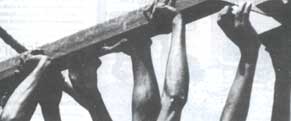Lend me your hands
 THE world's first hand transplant has been carried out by an international team of doctors at a French hospital. The right hand and forearm of an anonymous donor were attached to 48-year-old Australian Glint Hallam, whose hand was amputated in 1989 after an accident. Doctors attached "all the arteries, veins, nerves, tendons, muscles and skin after setting the two bones of the forearm", said a press release of the Edouard Herriot Hospital. The operation, which lasted for over 13 hours, was the result of recent advances in microsurgery and transplant techniques, it said. "The patient and the graft are currently in a stable and satisfactory condition," it added.
THE world's first hand transplant has been carried out by an international team of doctors at a French hospital. The right hand and forearm of an anonymous donor were attached to 48-year-old Australian Glint Hallam, whose hand was amputated in 1989 after an accident. Doctors attached "all the arteries, veins, nerves, tendons, muscles and skin after setting the two bones of the forearm", said a press release of the Edouard Herriot Hospital. The operation, which lasted for over 13 hours, was the result of recent advances in microsurgery and transplant techniques, it said. "The patient and the graft are currently in a stable and satisfactory condition," it added.
The team was headed by Jean-Michel Dubernard, head of transplant surgery at the hospital and Earl Owen, director of the Centre for Microsurgery in Sydney. Other doctors in the team included Marco Lanzetta of the University of Milan in Italy, Hari Kapila of Sydney, and Nadey Hakim of Saint Mary's Hospital in London. The hospital described the operation as representing a new "hope for millions of victims of accidents in the work-place and at home, for survivors of wars and of mines and for those born with congenital malformations".
"It's probably as major a breakthrough as the first heart transplant," said Hallam who is a businessperson from Perth. But it will be weeks before it is known if the procedure is a complete success.
Meanwhile, many doctors say that the operation will not produce a successful result. "The operation to transplant the hand of a dead person on to the arm is not likely to succeed," says a leading micro surgeon from Melbourne. Wayne Morrison, chief of microsurgery at St Vincent's Hospital, said the successful transplantation of non-vital organs would be significant and exciting. But Morrison said there was not, to his knowledge, sufficient evidence available about the immuno-suppressant drugs required to confidently predict the outcome of such a surgery. "I don't think it's likely to succeed," he said. "I think it's possibly premature but it's always difficult to judge circumstances from a distance."
Hallam, who lost his arm in a circular saw accident in a New Zealand prison 14 years ago, is believed to have needed police permission to leave the country. Western Australian police confirmed that Hallam had been charged with seven counts of fraud in October last year and was awaiting trial on a US $ 10,000 bail.
Morrison has carried out many limb replantations, including arms and fingers, and he heads the Bernard O'Brien Microsurgery Research Institute. From a purely surgical perspective, Morrison said transplantation was no different from replantation. The big hurdle was getting the immune system to accept a foreign limb. A consultant ethicist, Nick Tonti-Filippini, said transplanting a hand could be expected to have far greater psychological ramifications and therefore posed different ethical questions to organ transplants.
For now, the patient and the doctors are keeping their fingers crossed. "I don't know what will happen. We can't predict as this is the first time," says Owen. Hallam, father of four, said he was humbled by the opportunity to be the first person to receive a hand from a dead donor. His own hand was reattached after the accident, but it had no feeling or movement and he had it surgically removed. The team in Lyon was competing with other surgeons. In July, a team of surgeons in Louisville, Kentucky, USA, said they expected to perform such an operation by the end of the year. However, such a transplant carries risks. Patients must take anti-rejection drugs that can be potentially fatal.
